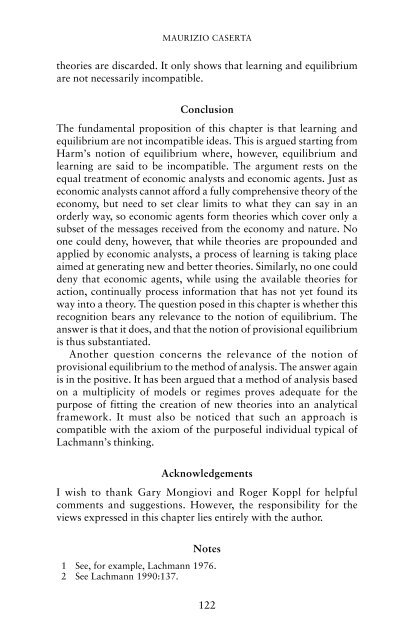Subjectivism and Economic Analysis: Essays in memory of Ludwig ...
Subjectivism and Economic Analysis: Essays in memory of Ludwig ...
Subjectivism and Economic Analysis: Essays in memory of Ludwig ...
Create successful ePaper yourself
Turn your PDF publications into a flip-book with our unique Google optimized e-Paper software.
MAURIZIO CASERTAtheories are discarded. It only shows that learn<strong>in</strong>g <strong>and</strong> equilibriumare not necessarily <strong>in</strong>compatible.ConclusionThe fundamental proposition <strong>of</strong> this chapter is that learn<strong>in</strong>g <strong>and</strong>equilibrium are not <strong>in</strong>compatible ideas. This is argued start<strong>in</strong>g fromHarm’s notion <strong>of</strong> equilibrium where, however, equilibrium <strong>and</strong>learn<strong>in</strong>g are said to be <strong>in</strong>compatible. The argument rests on theequal treatment <strong>of</strong> economic analysts <strong>and</strong> economic agents. Just aseconomic analysts cannot afford a fully comprehensive theory <strong>of</strong> theeconomy, but need to set clear limits to what they can say <strong>in</strong> anorderly way, so economic agents form theories which cover only asubset <strong>of</strong> the messages received from the economy <strong>and</strong> nature. Noone could deny, however, that while theories are propounded <strong>and</strong>applied by economic analysts, a process <strong>of</strong> learn<strong>in</strong>g is tak<strong>in</strong>g placeaimed at generat<strong>in</strong>g new <strong>and</strong> better theories. Similarly, no one coulddeny that economic agents, while us<strong>in</strong>g the available theories foraction, cont<strong>in</strong>ually process <strong>in</strong>formation that has not yet found itsway <strong>in</strong>to a theory. The question posed <strong>in</strong> this chapter is whether thisrecognition bears any relevance to the notion <strong>of</strong> equilibrium. Theanswer is that it does, <strong>and</strong> that the notion <strong>of</strong> provisional equilibriumis thus substantiated.Another question concerns the relevance <strong>of</strong> the notion <strong>of</strong>provisional equilibrium to the method <strong>of</strong> analysis. The answer aga<strong>in</strong>is <strong>in</strong> the positive. It has been argued that a method <strong>of</strong> analysis basedon a multiplicity <strong>of</strong> models or regimes proves adequate for thepurpose <strong>of</strong> fitt<strong>in</strong>g the creation <strong>of</strong> new theories <strong>in</strong>to an analyticalframework. It must also be noticed that such an approach iscompatible with the axiom <strong>of</strong> the purposeful <strong>in</strong>dividual typical <strong>of</strong>Lachmann’s th<strong>in</strong>k<strong>in</strong>g.AcknowledgementsI wish to thank Gary Mongiovi <strong>and</strong> Roger Koppl for helpfulcomments <strong>and</strong> suggestions. However, the responsibility for theviews expressed <strong>in</strong> this chapter lies entirely with the author.Notes1 See, for example, Lachmann 1976.2 See Lachmann 1990:137.122

















